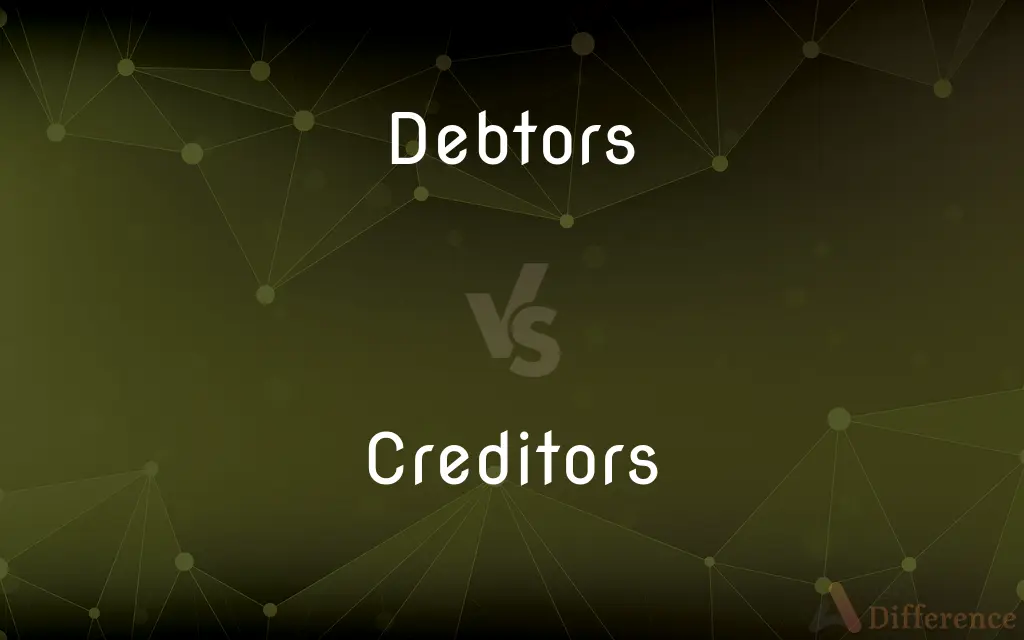Debtors vs. Creditors — What's the Difference?
By Tayyaba Rehman — Published on December 15, 2023
Debtors owe money, while Creditors are owed money. Debtors have a liability, whereas Creditors have an asset in the form of a receivable.

Difference Between Debtors and Creditors
Table of Contents
ADVERTISEMENT
Key Differences
Debtors are individuals or entities that owe money to others. In accounting, they represent an amount that is owed to a business, usually as a result of purchasing goods or services on credit. Debtors can be found on the balance sheet as accounts receivable or notes receivable.
Creditors, on the other hand, are individuals or entities that are owed money. They have provided goods, services, or lent money and are now awaiting payment. In a company's financial statements, Creditors might appear as accounts payable or other similar liabilities.
From a business's perspective, Debtors represent incoming cash flows, assuming they pay off their debts. When businesses sell goods or services on credit, they create Debtors. These Debtors are expected to pay their debts within the stipulated credit period.
Conversely, Creditors represent outgoing cash flows for a business. When businesses purchase goods or services on credit, they create liabilities, making them Debtors to their suppliers. However, the suppliers, in this case, become the Creditors, as they await payment.
In essence, the relationship between Debtors and Creditors is reciprocal. While Debtors owe money, Creditors are those to whom the money is owed. Both terms reflect the two sides of a transaction involving credit.
ADVERTISEMENT
Comparison Chart
Nature
Owe money.
Are owed money.
Position in Finance
Represent an asset.
Represent a liability.
Expectation
Expected to pay off debts.
Expect to receive payment.
Relation
Customer of a business.
Supplier or lender to a business.
Cash Flow
Incoming (when debts are paid).
Outgoing (when settling liabilities).
Compare with Definitions
Debtors
Debtors arise from credit sales.
After last month's promotions, the company saw an increase in Debtors.
Creditors
Creditors are entities to whom money is owed.
The company's Creditors are growing impatient for their payments.
Debtors
Debtors represent a claim on future cash inflows.
The firm's Debtors promised to clear their dues within 30 days.
Creditors
Creditors hold a claim against the company's assets.
The firm ensures it maintains good relations with its Creditors.
Debtors
Debtors can be short-term or long-term based on the credit period.
The majority of our Debtors settle their accounts within 60 days.
Creditors
Creditors arise when purchasing on credit.
Our policy to buy inventory on credit has increased the number of Creditors.
Debtors
Debtors are individuals or businesses owing money.
The Debtors listed in the ledger have yet to settle their accounts.
Creditors
Creditors reflect amounts payable in a business's books.
The accounts department is processing payments to the Creditors this week.
Debtors
Debtors reflect amounts receivable for a business.
We need to follow up with Debtors to ensure timely collections.
Creditors
Creditors can be short-term or long-term based on the credit terms given.
Our long-term Creditors are mainly financial institutions.
Debtors
One that owes something to another.
Creditors
One to whom money or its equivalent is owed.
Debtors
One who is guilty of a trespass or sin; a sinner.
Creditors
Plural of creditor
Debtors
Plural of debtor
Common Curiosities
Why might a company prefer to have more Creditors?
Having more Creditors might indicate a company is getting favorable credit terms, aiding cash flow.
Are Debtors an asset or liability?
Debtors are considered an asset.
What do Debtors represent in a business?
Debtors represent amounts of money owed to a business.
What do Creditors signify for a company?
Creditors signify amounts of money the company owes to others.
Is an accounts receivable the same as Debtors?
Yes, accounts receivable essentially represent Debtors in accounting.
What happens if Creditors are not paid on time?
Delayed payments to Creditors can lead to interest charges, loss of credit terms, or legal action.
How can businesses reduce the amount in Debtors?
Businesses can reduce Debtors by enforcing stricter credit policies and timely collections.
Can the terms Debtors and Creditors apply to individuals?
Yes, individuals can be Debtors when they owe money and Creditors when they are owed money.
Are accounts payable the same as Creditors?
Yes, accounts payable represent amounts owed to Creditors.
Is it better for a business to have more Debtors or Creditors?
It depends on the business's financial strategy, but a balanced approach to Debtors and Creditors is often optimal.
Can a business be both a Debtor and a Creditor?
Yes, a business can owe money (Debtor) and be owed money (Creditor) simultaneously.
Are Creditors an asset or liability?
Creditors are considered a liability.
How are Debtors and Creditors treated in bankruptcy?
In bankruptcy, Debtors seek relief from debts, while Creditors seek to recover amounts owed to them.
What risks are associated with having high Debtors?
High Debtors can result in cash flow problems and potential bad debts.
How can a company ensure timely payment from Debtors?
Companies can offer early payment discounts or employ strict credit control measures.
Share Your Discovery

Previous Comparison
Dell Mouse vs. Logitech Mouse
Next Comparison
Ribeye vs. DelmonicoAuthor Spotlight
Written by
Tayyaba RehmanTayyaba Rehman is a distinguished writer, currently serving as a primary contributor to askdifference.com. As a researcher in semantics and etymology, Tayyaba's passion for the complexity of languages and their distinctions has found a perfect home on the platform. Tayyaba delves into the intricacies of language, distinguishing between commonly confused words and phrases, thereby providing clarity for readers worldwide.












































